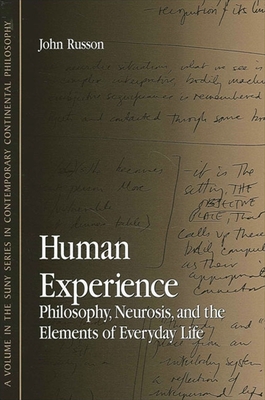Human Experience: Philosophy, Neurosis, and the Elements of Everyday Life

Human Experience: Philosophy, Neurosis, and the Elements of Everyday Life
Co-winner of the 2005 Biennial Book Prize for the best philosophy book published in English presented by the Canadian Philosophical Association
John Russon's Human Experience draws on central concepts of contemporary European philosophy to develop a novel analysis of the human psyche. Beginning with a study of the nature of perception, embodiment, and memory, Russon investigates the formation of personality through family and social experience. He focuses on the importance of the feedback we receive from others regarding our fundamental worth as persons, and on the way this interpersonal process embeds meaning into our most basic bodily practices: eating, sleeping, sex, and so on. Russon concludes with an original interpretation of neurosis as the habits of bodily practice developed in family interactions that have become the foundation for developed interpersonal life, and proposes a theory of psychological therapy as the development of philosophical insight that responds to these neurotic compulsions.
333.28Lei
333.28Lei
Livrare in 2-4 saptamani
Descrierea produsului
Co-winner of the 2005 Biennial Book Prize for the best philosophy book published in English presented by the Canadian Philosophical Association
John Russon's Human Experience draws on central concepts of contemporary European philosophy to develop a novel analysis of the human psyche. Beginning with a study of the nature of perception, embodiment, and memory, Russon investigates the formation of personality through family and social experience. He focuses on the importance of the feedback we receive from others regarding our fundamental worth as persons, and on the way this interpersonal process embeds meaning into our most basic bodily practices: eating, sleeping, sex, and so on. Russon concludes with an original interpretation of neurosis as the habits of bodily practice developed in family interactions that have become the foundation for developed interpersonal life, and proposes a theory of psychological therapy as the development of philosophical insight that responds to these neurotic compulsions.
Detaliile produsului










